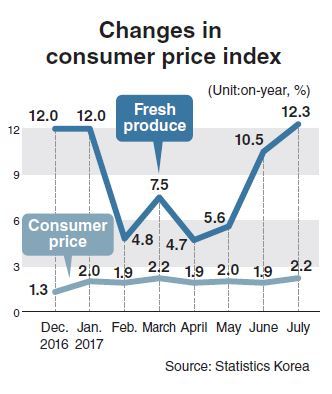Consumer prices up 2.2% in July due to weather: data
By Korea HeraldPublished : Aug. 1, 2017 - 15:43
South Korea’s consumer prices surged in July at the fastest pace in four months, mainly due to a recent rise in fruit and vegetable prices after a period of alternating droughts and floods, government data showed Tuesday.
Faced by record-high inflation in the costs of living necessities, the government pledged to offer discounts of up to 50 percent on selected vegetables and to increase the stock of livestock and marine products, in preparation for national holidays in early October.

The biggest change was in the prices of fruits and vegetables, which saw 20 percent and 10.1 percent on-year increases, respectively. The statistics office attributed this to monthslong droughts in spring and recent floods and heat waves.
Pumpkin prices skyrocketed by 40.5 percent last month, while watermelon prices jumped 20 percent.
“Last month’s weather conditions contributed to the steep rise in consumer prices,” said Woo Young-jae, price statistics director.
“The consecutive drought, flood and heat waves delivered a serious impact on the supply of farm products.”
Prices of livestock and marine products also rose 8.1 percent and 5.7 percent on-year, respectively, during the same period, data showed.
Electricity, water and gas fees also jumped 8 percent on-year, boosting the overall price index by 0.29 percentage point.
The market basket price index -- consisting of core living necessities such as agricultural goods and energy fees -- rose 3.1 percent in July, recording the steepest increase since January 2012.
“As 0.65 percentage point of the index rise was due to the electricity bills, the actual inflation in other living necessities was around 2.4 percent,” Woo said.
In contrast to the price surge in the agricultural, livestock and marine sectors, the uptrend in petroleum prices slowed to 0.5 percent last month, reflecting falling crude prices.
The government, led by the Ministry of Strategy and Finance, decided to prioritize stabilizing the supply of agricultural, livestock and fisheries goods.
“The government will strengthen countermeasures on vegetable supplies,” Lee Joo-hyun, price policy director at the ministry, said in a press briefing.
Aiming to stabilize the market by the Chuseok holiday in early October, the government will first carry out a discount of up to 50 percent on key vegetables and fruits until Aug. 10 and then work on expanding the stock for livestock and fisheries goods throughout August and September, according to officials.
By Bae Hyun-jung (tellme@heraldcorp.com)
Faced by record-high inflation in the costs of living necessities, the government pledged to offer discounts of up to 50 percent on selected vegetables and to increase the stock of livestock and marine products, in preparation for national holidays in early October.

The biggest change was in the prices of fruits and vegetables, which saw 20 percent and 10.1 percent on-year increases, respectively. The statistics office attributed this to monthslong droughts in spring and recent floods and heat waves.
Pumpkin prices skyrocketed by 40.5 percent last month, while watermelon prices jumped 20 percent.
“Last month’s weather conditions contributed to the steep rise in consumer prices,” said Woo Young-jae, price statistics director.
“The consecutive drought, flood and heat waves delivered a serious impact on the supply of farm products.”
Prices of livestock and marine products also rose 8.1 percent and 5.7 percent on-year, respectively, during the same period, data showed.
Electricity, water and gas fees also jumped 8 percent on-year, boosting the overall price index by 0.29 percentage point.
The market basket price index -- consisting of core living necessities such as agricultural goods and energy fees -- rose 3.1 percent in July, recording the steepest increase since January 2012.
“As 0.65 percentage point of the index rise was due to the electricity bills, the actual inflation in other living necessities was around 2.4 percent,” Woo said.
In contrast to the price surge in the agricultural, livestock and marine sectors, the uptrend in petroleum prices slowed to 0.5 percent last month, reflecting falling crude prices.
The government, led by the Ministry of Strategy and Finance, decided to prioritize stabilizing the supply of agricultural, livestock and fisheries goods.
“The government will strengthen countermeasures on vegetable supplies,” Lee Joo-hyun, price policy director at the ministry, said in a press briefing.
Aiming to stabilize the market by the Chuseok holiday in early October, the government will first carry out a discount of up to 50 percent on key vegetables and fruits until Aug. 10 and then work on expanding the stock for livestock and fisheries goods throughout August and September, according to officials.
By Bae Hyun-jung (tellme@heraldcorp.com)
-
Articles by Korea Herald







![[KH Explains] Hyundai's full hybrid edge to pay off amid slow transition to pure EVs](http://res.heraldm.com/phpwas/restmb_idxmake.php?idx=644&simg=/content/image/2024/04/18/20240418050645_0.jpg&u=20240419100350)







![[From the Scene] Monks, Buddhists hail return of remains of Buddhas](http://res.heraldm.com/phpwas/restmb_idxmake.php?idx=652&simg=/content/image/2024/04/19/20240419050617_0.jpg&u=20240419175937)

![[KH Explains] Hyundai's full hybrid edge to pay off amid slow transition to pure EVs](http://res.heraldm.com/phpwas/restmb_idxmake.php?idx=652&simg=/content/image/2024/04/18/20240418050645_0.jpg&u=20240419100350)

![[Today’s K-pop] Illit drops debut single remix](http://res.heraldm.com/phpwas/restmb_idxmake.php?idx=642&simg=/content/image/2024/04/19/20240419050612_0.jpg&u=)